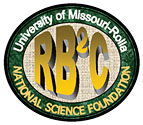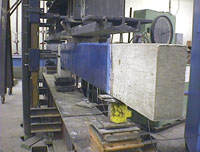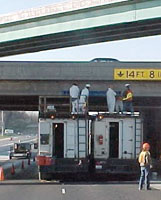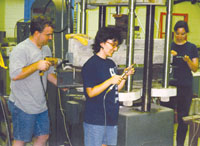

Center for Repair of Buildings and Bridges with Composites (RB2C)
University of Missouri-Rolla
A National Science Foundation Industry/University Cooperative Research Center since 1999
Advanced composites provide a great, untapped potential to strengthen, rehabilitate, and repair civil structures such as buildings and bridges

|
Center Mission and Rationale
The Center provides university researchers with the opportunity to access the knowledge, experience, interests, and resources of industry partners. The partners provide expertise and resources in the fibers, polymers, design, and application of advanced composites. The Center provides technical expertise, the research resources of the University of Missouri-Rolla, and a forum for technology development and transfer that could not be assembled by any of the individual players.

|
Structural retrofit work has come to the forefront of industry practice in response to the aging of buildings and civil infrastructure worldwide. In addition, there have been major revisions to the structural codes to better withstand natural phenomena, such as earthquakes. These two forces create a great need for more effective materials, methods, and techniques for structural rehabilitation. An effective retrofit solution is one that is durable and relatively easy to design and evaluate, while minimizing the need for specialized labor and service disruption and lowering total costs, even when requiring more expensive material. On this basis, advanced composites offer a great opportunity to provide improved repair solutions.
Research Program
The primary research activities of the center involve: 1) the development of products and manufacturing methods that use advanced composites for the rehabilitation and strengthening of buildings and bridges; 2) development of installation processes and approaches for engineering design; 3) testing, monitoring, and evaluation of repaired structures; 4) standardization and code approval of products and design protocols; and 5) education and technology transfer. Areas in which the Center is currently conducting research include-
- Improvement of existing construction materials and methods, with emphasis on concrete and composites
- Compliance between existing and repair materials, with emphasis on interfacial properties
- New composites and manufacturing methods
- New design and construction procedures
- Equipment and sensors related to in-situ static and dynamic load testing for assessment and verification of rehabilitation/strengthening procedures
- Equipment and sensors related to quality control and assurance of repair
- Equipment and sensors related to long-term performance monitoring
- Protocol for rapid in-situ testing of structural components or assemblies that allows for data interpretation and analysis
- Engineering of strengthening projects that require the use of composites as the primary structural reinforcement
- Techniques and delivery systems to retrofit existing buildings and bridges
- Real-time structural health monitoring of critical systems.

|
Special Center Activities
The Center is integrating the research activities with the development of academic and continuing education programs. Undergraduate and graduate students gain exposure to R&D activities taking place at the Center. At the same time, the undergraduate engineering curriculum is being modified and expanded in the area of building and civil infrastructure rehabilitation. Processes under development will provide undergraduate students with opportunities for practical experience in the form of internships with industry partners.
Facilities
The Center is based at the University of Missouri-Rolla (UMR). The leading units at this institution are the Civil Engineering, Chemistry, Electrical Engineering, Engineering Management, and Mechanical/Aerospace/Engineering Mechanics Departments. These units complement each other in terms of focus areas and fields of expertise (e.g., structures/construction, sensors, composite manufacturing, materials, and management).
Collectively, the UMR interdisciplinary research team addresses all aspects of the R&D process related to repair of buildings and bridges with composites. These aspects include: materials, manufacturing, controls, intelligent sensing, structural assessment, numerical analysis, simulation, structural analysis, structural design, structural optimization, construction automation, specification writing, standardization, building code writing, structural performance monitoring, life cycle costs, and infrastructure management. These researchers comprise a highly motivated and interactive team of students, faculty, and staff.
Center Headquarters
Center for Repair of Buildings and Bridges with Composites
University of Missouri-Rolla
224 Engineering Research Lab
1870 Miner Circle
Rolla, MO 65409-0710
Tel (573) 341-4497 * Fax (573) 341-6215
Homepage: www.rb2c.umr.edu
Center Director: Dr. Antonio Nanni
(573) 341-4497 * nanni@umr.edu
Associate Director: Dr. Pedro Silva
(573) 341-6280 * silvap@umr.edu
Center Evaluator: Dr. Halvard E. Nystrom
(573) 341-4624 * nystom@umr.edu
NSF 01-168v